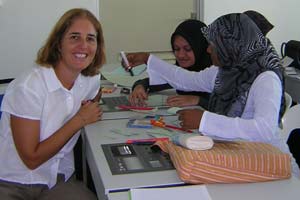Reconstruction means more than rebuilding homes or schools. It's also about restoring normalcy into the life of a community, opening new opportunities and planning for the future. Australian Volunteers International (AVI)–part of the Australian Government volunteers program recently supported critical education and urban planning projects in areas greatly affected by the Indian Ocean tsunami.
In the Maldives, the Faculty of Teacher Education established a training resource centre and introduced child–friendly teaching methods to schools, with the support of four AVI teacher trainers and the Victorian Government.
Rhonda Di Biase was one of the four teacher trainers who moved to the Maldives to start a two year assignment as a part of the Tsunami Recovery project. Male, the capital of the Maldives, wasn't exactly as Rhonda Di Biase pictured it.
'I pictured wide sandy beaches but instead found a densely populated city, bursting at the seams,' says the AVI teacher trainer. 'After the tsunami, people flocked to the capital. It's not uncommon for families to sleep in shifts in order to accommodate all the people who reside in each house.'
Male's burgeoning population has placed a massive burden on the country's education system. Teachers from India and Sri Lanka were reluctant to return to the Maldives after the tsunami, leaving schools unable to cope with the influx of students.
The Victorian Government, as part of its $10 million post–tsunami reconstruction program, has partnered with AVI and UNICEF to help address the teacher shortage. By sending a team of teacher volunteers to assist with teacher training and development, long–term dependence on foreign teachers is reduced.
'Education is key to a country's long–term prosperity and development, which is why the Victorian Government is funding this project as part of its commitment to tsunami–affected areas,' explains Sue Williams, international development manager within the Victorian Department of Premier and Cabinet.
'The project has two aspects: supporting the professional development of existing teachers, and ensuring a steady supply of new teachers. UNICEF has established teaching resource centres for teachers working in outlying islands, and AVI volunteers work at these centres to develop training programs and teaching aids.
'Volunteers are also working with the Maldives College of Higher Education in Male to improve curricula and support the training of new teachers.'
The Child-friendly Schooling model was developed by UNICEF and promotes inclusiveness, empowerment, and child–centred education. It is a marked change from previous methods of teaching, where students learnt by rote from textbooks. They will now learn in and out of the classroom, plan and complete their own projects, and benefit from learning aids.
Rhonda Di Biase said the uptake of Child-Friendly Schooling was dependent on building good relationships with teachers and education managers.
'Initially I felt like I was filling holes,' she said. 'This semester I had counterparts who will take over my subjects when I leave the faculty next year. I have gone from teaching a single class to introducing a plan to work with each department in their primary teaching courses. Gradually, I'll pull back from a direct role and leave tools in place for my colleagues to use as the faculty grows.'
More information

